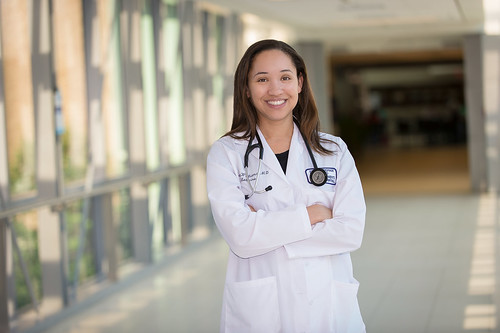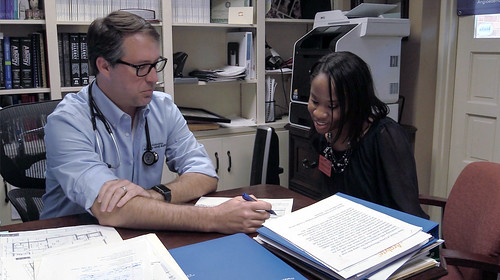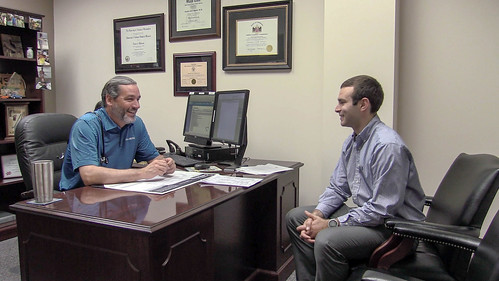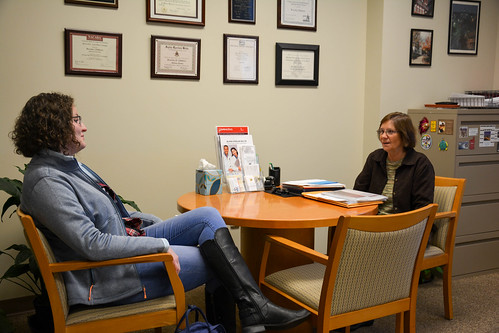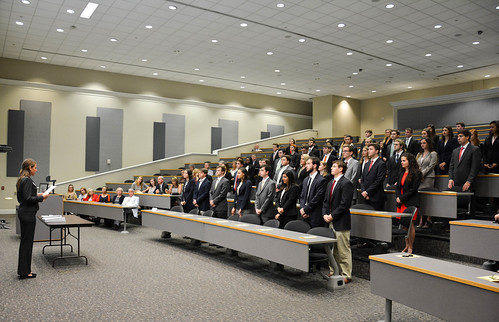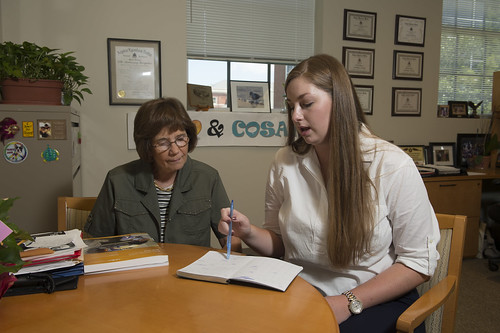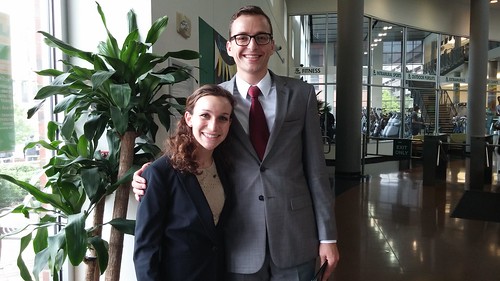Professional school acceptance rates soar for Auburn students
Students in the College of Sciences and Mathematics at Auburn University are consistently accepted to medical school at a rate that is more than 30 percent higher than the national average. Additionally, acceptance rates of Auburn students to optometry and dental schools are at 85 to 100 percent almost every year. The reason for these long-standing statistics has much to do with Beverley Childress, pre-health professions director for the College of Sciences and Mathematics. For more than 19 years, Childress has mentored, guided and established programs for Auburn students who have a desire for a career in healthcare.
A solid foundation - where it all begins:
Long before a student is ready to apply for health professional school, the College of Sciences and Mathematics offers tools to assist undergraduates along the way. Guidance begins during a student’s freshman year with the Pre-Health Orientation Course. The course, along with mandatory academic advising, equips students with information for maneuvering through their undergraduate degree programs in a timely manner; they receive relevant advice about free tutoring and other academic support programs if struggling with a class or grades. In addition to general resources, the class features guest speakers such as dental, medical and other admissions deans, who inform students about how to become competitive applicants. Doctors, dentists and healthcare providers also talk to the classes, giving students behind-the-scenes information about the day-to-day lives of various healthcare professionals.
“We expose them to several different health professions so they can make a good decision about the best path to follow,” said Childress. “Krysta Diehl [pre-health counseling specialist for the College of Sciences and Mathematics], teaches two sections of the class, and she also uses 10 peer advisors to help with the classes so they can work with the students in smaller groups in the 273-seat auditorium. This provides students with an opportunity for more personalized guidance.”
Alpha Epsilon Delta:
Childress is also the faculty advisor for the Auburn University chapter of Alpha Epsilon Delta, a national pre-health honor society. Auburn’s Alabama Gamma chapter was founded in 1932 and is the primary source of information about the health professions and pre-health programs on campus. Any Auburn University student can become an associate member. Besides listening to guest speakers representing all of the health professions, including admissions deans, local healthcare providers and alumni now attending professional school programs, the chapter strives to provide service to Auburn University and the community through volunteerism. Members spend time at local food banks and elementary schools; help at Camp Smile-A-Mile, a summer camp for children with cancer and their family members; assist at Storybook Farm, a therapeutic horse riding facility for disabled or disadvantaged children; and participate in other community service events and programs.
“Internally, AED members support one another through peer mentoring programs for younger college students interested in the health professions,” said Childress. “Auburn chapter members, including current and prospective officers, attend the national AED convention held every other year, at which the Auburn chapter has won an award every year since 2002 for its activities.”
Finally, the Alabama Gamma chapter taps students and honorary members for national membership at a formal initiation ceremony and reception each spring. Those selected for honorary membership include representatives from Alabama professional school programs, local healthcare providers, and alumni who have taken a personal interest in helping members reach their personal and professional goals.
Mock interviews:
Students have an opportunity to participate in mock interviews during sophomore year with admissions committee members from professional schools in Alabama and beyond. During fall semester, individual interviews in Martin Hall are made available for pre-occupational therapy, pre-physician assistant and pre-physical therapy students. Pre-dental, pre-optometry, pre-medical and pre-pharmacy students interview during the spring semester. Students dress professionally and bring a resume for review by the interviewers. They receive feedback about their competitiveness and suggestions for improvement about a year before they begin the application process.
Premedical Preceptorship program:
Students who are serious about a career in the health professions can also participate in the Premedical Preceptorship program, which is coordinated by Childress. The program provides an opportunity for pre-health students to shadow local physicians and physician assistants at East Alabama Medical Center and individual clinics.
“Many of the healthcare providers in the community came through the College of Sciences and Mathematics’ pre-health program and assist us by participating in the premed preceptorship,” said Childress. “They also provide scholarships and mentorship, and they talk with our students candidly about the benefits and challenges associated with their careers. Our students could not ‘survive and thrive’ without the loyal support of our alumni, and we appreciate the college’s Office of Development staff for making this possible.”
The application process and the Pre-Professional Advisory Committee:
The Pre-Professional Advisory Committee, or PPAC, is chaired by Childress and is perhaps the most important contributing factor to Auburn University’s above average acceptance rates to health professional schools. Her efforts with PPAC ensure that pre-health students have the tools and information they need to put their best foot forward when applying to medical, dental or optometry schools. The committee helps Auburn students with the application process, and it consists of faculty leadership from across the university, but primarily from the Department of Biological Sciences.
During their junior year, pre-health students submit their resumes to the committee for review. Childress conducts challenging interviews with every student who is applying to professional school, about 160 students per year. Included in that number are Auburn University applicants to dental, medical and optometry schools, rural medical program applicants, alumni who graduated in the last few years, and students and alumni reapplying for the second or third time.
Each applicant must also have an interview with one randomly assigned member of the committee and three other people they select to interview and evaluate them.
“Each committee member interviews 15 to 20 students, which provides a valuable opportunity for our students to improve before they sit for an actual interview at a professional school,” said Childress. “We give them honest feedback about their performance. We also critique their personal statements and their resumes. Once they have applied, I review each student’s resume, interview feedback, test scores and professional school application, and I draft a committee letter for each applicant. I transmit the committee letter plus the other individual evaluation forms and letters to the professional schools at the student’s written request. The process is very time consuming, and our faculty are not compensated for being on the committee, which is a testament to the dedication of Auburn’s faculty. The PPAC process is complex, but it frees the students from having to coordinate their applications alone, and it provides a clear path through the application process.”
Results:
PPAC perseverance translates into exceptional results, with medical school acceptance rates at more than 30 percent above the national average, and optometry and dental school acceptance rates averaging close to 100 percent each year. Although Childress will readily cite phenomenal students, enthusiastic Auburn faculty and supportive health professionals as reasons for the high acceptance rates of Auburn students applying to medical, dental and optometry schools, it is Childress herself who is, perhaps, the secret ingredient that sets the university apart. She forms lasting relationships with students who continue to contact her year after year to thank her for her help.
Stephanie Donaldson, who is a first-year medical student at the University of Alabama at Birmingham had this to say:
Today in my small group meeting, my preceptor [on UAB's Admissions Committee] was bragging about how Auburn has, by far, the best pre-admissions program. He went on to compliment Mrs. Childress’s work and the efforts that go into preparing students and their committee letter. I want to thank Mrs. Childress for her time, effort, advice and care over me and my peers through undergrad, and for making our dreams a reality. Her work and compassion for students do not go unnoticed.
Also, I received a scholarship from UAB through the Burleson Foundation, which will keep me from having to take out loans and manage the financial burden of medical school on top of the academic load. I am forever thankful for the advice and encouragement Mrs. Childress gave me over the years, without which none of this could have happened.
It is easy for students like me to get bogged down and give up, but her passion for helping pre-meds succeed has helped me more than she will ever know. I remember thinking many times, ‘Mrs. Childress works so hard for us. She believes we have the potential. I just need to believe I can do it, too.’ God uses each of us in unique ways, and I am sure the work Mrs. Childress does so whole-heartedly at Auburn touches many lives.
Nicholas Giordano, dean of the College of Sciences and Mathematics, had this to say about Childress’s efforts: “Beverley Childress is totally dedicated to her students. She leads a fantastic program that gives students a rigorous preparation for admission to their chosen professional schools and then academic success after they leave Auburn. She has touched the lives of so many students, and I know that it gives her great pleasure when a former student drops in for a visit. And she remembers everyone.”
Indeed, Childress makes a point of concerning herself with both the academic superstars and those who struggle.
“We encourage those who do not get into professional school the first time and remind them that it’s only the end of the world and time to give up if they want to give up,” said Childress. “I have students who have gotten in on the fifth try. Our job is to help them decide whether to redirect their efforts or keep fighting.”
Although students, alumni and College of Sciences and Mathematics faculty and staff are quick to recognize Childress’s dedication and hard work, she always notes the efforts of others who contribute to the success of Auburn students.
“The truth is that I could not do my work without the assistance of every other employee in the college. Our work at Auburn is truly a family affair, and our high rate of acceptance to professional schools is due to a lot of hard work,” said Childress. “Auburn has a long-term record of doing an excellent job of preparing doctors, dentists, optometrists and other healthcare providers to succeed at the next level in professional schools and to become leaders in their chosen professions. It starts with the faculty and administrators designing a rigorous curriculum and setting high academic standards.
“Also, the deans and associate deans in the College of Sciences and Mathematics have always been very supportive of academic advising and the professional development of our advisors so they can learn to help students avoid mistakes. Finally, I would be remiss if I did not recognize Dr. Lawrence Wit, who has been my mentor and source of encouragement since I came to the college; Dr. Beth Yarbrough and Mrs. Krysta Diehl, who listen well and advise me, and Mrs. Anna Allen, who keeps me organized for PPAC, as well as the college’s academic advisors for their support and encouragement throughout my time at Auburn.”
Latest Headlines
-
02/12/2025
-
02/11/2025
-
02/10/2025
-
01/30/2025
-
12/03/2024

